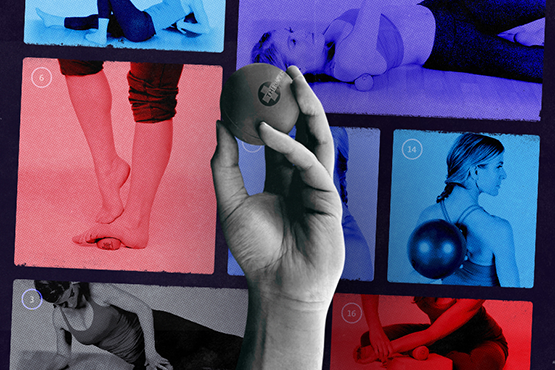
Talking, chewing and tension all have something in common – the temporalis muscle, which is located on the temporal aspect (the side) of the cranium. The temporalis is a broad, fan-shaped muscle that covers much of the temporal bone.

There are four muscles that help you eat and talk, known as the mastication group. The lateral pterygoid is in charge of lowering your jaw allowing the mouth to open, or depress the mandible. The masseter, medial pterygoid and temporalis close the mouth, or elevate the jaw/mandible.
Reflect on how many hours a day you talk, eat and clench (including sleep). When we overwork any muscle for whatever reason, whether it’s a busy day at work with a lot of presentations, teaching several yoga classes back to back, or in stressful situations, our muscles fatigue from continually having to contract. One of the many reasons why clenching teeth is so detrimental is that this action causes the temporalis to be in a chronic state of contraction. We all know stress isn’t great on the body or the mind but add the masseter and the temporalis to the list as these are some of the first muscles to contract during a stressful situation.
It wouldn’t be surprising to find a tight temporalis if you experience frequent headaches or pain in various regions of your head. Pain associated with an aggravated temporalis can be disguised as pain at the side of the head in front, above or behind the ear, pain in the eyebrow area, cheek, incisor and molar teeth, in the upper teeth when biting down or teeth that are sensitive to hot or cold temperatures.
If any of this information is hitting home, relieving the temporalis might be something to explore in addition to paying attention to pain patterns you experience during stressful times. When you take the time to observe your tendencies of muscle tension in the face, seize the opportunity and cultivate deep, abdominal breaths. Give your nervous system a chance to down-regulate and release all tight muscles in your body – not just the ones that help you talk and chew.
Come back on Friday to learn how to pacify a tense temporalis!
Learn about our stress relief solutions
Discover the YTU Pose of the Week
Read more posts on face and jaw










Wow this is very interesting, I was just describing to a few people today that I get regular headaches on a certain day of the week, after reading this it makes me wonder if its because I teach back to back classes the day before which requires talking a lot more then I normally do.
Thinking about the mastication group, and giving it a little TLC is a great way for selfcare. This post is extremely helpful to me. Love the diagram of where the muscles are located.
It’s interesting to consider all the different pain referral patterns that can be caused by a tight temporalis, suggesting it might be good to roll and relieve it even when we don’t think it’s responsible for a headache.
Interesting. I grind at night, and sometimes will get a headache the next day from a particularly hard night of grinding. Will definitely try the balls for the headache and I am wondering if some pre-emptive rolling before bed would help reduce the grinding by relaxing the area first.
Hi Stephanie,
Are there any other ways the temporalis can be aggravated? Is it safe to suggest a student roll out their temporalis? What is the best way to address this tension/pain?
Thanks!
I usualy take more time on the masseter and tend to neglect the temporalis. Interessting post thanks!
Rolling the ball on the whole temporalis feels a complete different relief on my face and my jaws. Thanks pointing out the extensive size of the muscle.
Wow, new info every blog post I read. The Temporalis Muscle is new to me and makes sense as to why I feel tension there when I am stressed and grinding my teeth. Incredible how surrounds the side of the head and ear and down the jaw. So much now to focus on now 😀
Wow, new info every blog post I read. The Temporalis Muscle is new to me and makes sense as to why I feel tension there when I am stressed and grinding my teeth. Incredible how surrounds the side of the head and ear and down the jaw. So much now to focus on.
Thanks for this! Just now at my computer, viewing the diagram of the temporalis muscle and visualizing softening all around the sides of my skull helped me to relax my jaw. I clench my teeth sometimes when I’m stressed and studying for school. I’ll try getting in touch with this muscle next time and see if it helps.
I know a few people who suffer from headaches. I will observe their jaw, and suggest some rolling exercises if they are open to it.
spent some time rolling out on the balls yesterday, my jaw felt amazing after… not to mention my face 🙂 Peace
Stephanie…how relevant this is, today!
I’m experiencing a dull temporal headache right now. I never would have attributed it to stress. I found myself thinking, was it a headstand? Sleeping in a funky way? It’s clear to me now that all the new things we are trying to absorb has contributed to stress I’m UNCONCIOUSLY clenching my jaw. I will now have a go to as something I can to to feel better.
Thank you for providing that awareness
Omg I’m a teeth-grinder at night and could it be the cause of my regular migraines that last several days at a time? I always feel better after I do some ball work around my neck but I must try the temple thing too! This is such a game changer for me. Thank you for sharing your experience and wisdom!
I never realized the temporalis was so large. Or covered such a large portion of the side of the head, no wonder tension in it is linked to migraines and headaches. An area to explore more, for sure.
Try PNFing the TMJ to help loosen up the tight joint that most people have as well. I love massaging the temporalis and the frontalis as I find the Parasympathetic Nervous System kicks in and people are really able to relax and fall asleep 🙂 You know you’ve done well when people can relax to the point of sleep.
I get terrible migraines after working out at times. I can prevent it with rolling, but sometimes it will linger in the sides of my skull and eyeballs. I am excited to check out how to use the YTU balls to massage my temporals. Mmm.
As a dental hygienist and yoga teacher I too often have seen this issue and do facial yoga and acupressure points in my yoga classes for this area. I also suggest that people cut there food into smaller bites to not over extent these muscles.
I tend to clench my jaw constantly and grind my teeth at night. It’s interesting to consider the same muscles I use to talk and chew with can get fatigued like overworked quadriceps. My poor temporalis never gets a break! I used the yoga tune up balls for the first time today on my SCM, which relieved some tension, but was looking for a trick to keep the jaw relaxed while, say, in savasana. For example, does touching the tip of the tongue to the top of the mouth or some other exercise help to relax the face?
Love using my YTU balls on this area. They’re the only massage tools I’ve found that are soft and pliable enough to apply gentle pressure to a thin muscle in a sensitive area, like this one.
I read the blog about how to massage the tension first. Definitely something I get because of stress. All the symptom’s describes here reminds me what I do to calm myself subconsciously. I wouldn’t figure stress would play a factor in my temporalis muscle as much as it does on my shoulders. I naturally just pop an advil, give a little massage with my hands to the sides of my head, and then call it a day. After trying yoga balls on the muscle I realize how tight they really are. Never till today ever massaged them out.
I like how you provided signs of a stressed out temporalis because it helps me to get a picture of how to be more in tune with my body by knowing the specific muscle that is aggravated if/when experiencing these symptoms.
Nicole, chewing gum is very closely related to a lot of the activities listed in the article. It’s just like chewing your food, except not swallowing anything. You would still be contracting the muscle in order to make the chewing motion with gum. I try to avoid chewing gum because it has caused me pain in the past, usually after about 20-30 minutes of chewing.
How might chewing gum relate to temporalis overuse or TMJ? Thoughts on a maximum amount of time to chew gum to avoid this?
This is my guy! Every time I get a YTU ball up there it’s a bizarre combination of agonizing and amazing. Can’t wait for the rest of this post (and I’m a classic TMJD patient too, with every single related symptom. Yay me 🙂
Interesting read. I tend to forget about the muscles of the head – but just the other day I had a weird sensitivity in my teeth and didn’t think about chronic tension or clenching as a potential cause. As always from these blogs, something more to consider and evaluate further. Thanks.
Hi! It is a very informative blog. Do you think that inversions would help with the tension or would they make it worse? Do you think migranes might also be caused by tension in the temporalis muscle? Thanks!
I have TMJ and that in itself is already a burden but reading more about this and how it can cause headache when its high stress and hours and hours of talking to people something clicked in my head. When I used to work corporate accounting the controller and CFO that I reported to directly always had these massive headaches. I never really knew it or noticed it so much because they pretty much functioned just fine. Although at some point I found out about their chronic pains because they were talking about what medicine helps relieve this for them. So anyway the job was definitely hectic and high pressure and now I know the science behind it. They probably had tight temporalis.
It is funny that we always forget about these muscles! The are so strong that they can cause damage to your teeth. This article does a great job of reminding me that the body is all connected. So often I try to treat where the pain is coming from ie Advil, Tylenol, ect… I am definitely guilty of clenching my masseter, my medial pterygoid and my temporalis muscles. The moment I get lost in thought or am trying to really focus, my jaw clenches right up. I get headaches and I blame my sinuses or stress but now I see it most likely the muscles!
Got me thinking as I’ve TMJ/TMD issues…maybe this why after a shower and a shampoo, there is a lot of relief. Shampooing is a way to massage those areas. Looking forward to your next blog.